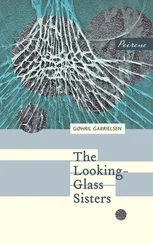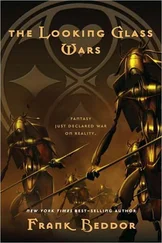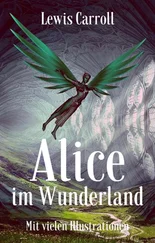“What do you call yourself?” the Fawn said at last. Such a soft sweet voice it had!
“I wish I knew!” thought poor Alice. She answered, rather sadly, “Nothing, just now.”
“Think again,” it said: “that won't do.”
Alice thought, but nothing came of it. “Please, would you tell me what YOU call yourself?” she said timidly. “I think that might help a little.”
“I'll tell you, if you'll move a little further on,” the Fawn said. “I can't remember here.”
So they walked on together though the wood, Alice with her arms clasped lovingly round the soft neck of the Fawn, till they came out into another open field, and here the Fawn gave a sudden bound into the air, and shook itself free from Alice's arms. “I'm a Fawn!” it cried out in a voice of delight, “and, dear me! you're a human child!” A sudden look of alarm came into its beautiful brown eyes, and in another moment it had darted away at full speed.
Alice stood looking after it, almost ready to cry with vexation at having lost her dear little fellow-traveller so suddenly. “However, I know my name now.” she said, “that's SOME comfort. Alice—Alice—I won't forget it again. And now, which of these finger-posts ought I to follow, I wonder?”
It was not a very difficult question to answer, as there was only one road through the wood, and the two finger-posts both pointed along it. “I'll settle it,” Alice said to herself, “when the road divides and they point different ways.”
But this did not seem likely to happen. She went on and on, a long way, but wherever the road divided there were sure to be two finger-posts pointing the same way, one marked “TO TWEEDLEDUM'S HOUSE” and the other “TO THE HOUSE OF TWEEDLEDEE.”
“I do believe,” said Alice at last, “that they live in the same house! I wonder I never thought of that before—But I can't stay there long. I'll just call and say “how d'you do?” and ask them the way out of the wood. If I could only get to the Eighth Square before it gets dark!” So she wandered on, talking to herself as she went, till, on turning a sharp corner, she came upon two fat little men, so suddenly that she could not help starting back, but in another moment she recovered herself, feeling sure that they must be
Chapter IV
TWEEDLEDUM AND TWEEDLEDEE
They were standing under a tree, each with an arm round the other's neck, and Alice knew which was which in a moment, because one of them had “DUM” embroidered on his collar, and the other “DEE.” “I suppose they've each got “TWEEDLE” round at the back of the collar,” she said to herself.
They stood so still that she quite forgot they were alive, and she was just looking round to see if the word “TWEEDLE” was written at the back of each collar, when she was startled by a voice coming from the one marked “DUM.”
“If you think we're wax-works,” he said, “you ought to pay, you know. Wax-works weren't made to be looked at for nothing, nohow!”
“Contrariwise,” added the one marked “DEE,” “if you think we're alive, you ought to speak.”
“I'm sure I'm very sorry,” was all Alice could say; for the words of the old song kept ringing through her head like the ticking of a clock, and she could hardly help saying them out loud:—
“Tweedledum and Tweedledee
Agreed to have a battle;
For Tweedledum said Tweedledee
Had spoiled his nice new rattle.
Just then flew down a monstrous crow,
As black as a tar-barrel;
Which frightened both the heroes so,
They quite forgot their quarrel.”
“I know what you're thinking about,” said Tweedledum: “but it isn't so, nohow.”
“Contrariwise,” continued Tweedledee, “if it was so, it might be; and if it were so, it would be; but as it isn't, it ain't. That's logic.”
“I was thinking,” Alice said very politely, “which is the best way out of this wood: it's getting so dark. Would you tell me, please?”
But the little men only looked at each other and grinned.
They looked so exactly like a couple of great schoolboys, that Alice couldn't help pointing her finger at Tweedledum, and saying “First Boy!”
“Nohow!” Tweedledum cried out briskly, and shut his mouth up again with a snap.
“Next Boy!” said Alice, passing on to Tweedledee, though she felt quite certain he would only shout out “Contrariwise!” and so he did.
“You've been wrong!” cried Tweedledum. “The first thing in a visit is to say “How d'ye do?” and shake hands!” And here the two brothers gave each other a hug, and then they held out the two hands that were free, to shake hands with her.
Alice did not like shaking hands with either of them first, for fear of hurting the other one's feelings; so, as the best way out of the difficulty, she took hold of both hands at once: the next moment they were dancing round in a ring. This seemed quite natural (she remembered afterwards), and she was not even surprised to hear music playing: it seemed to come from the tree under which they were dancing, and it was done (as well as she could make it out) by the branches rubbing one across the other, like fiddles and fiddle-sticks.
“But it certainly WAS funny,” (Alice said afterwards, when she was telling her sister the history of all this,) “to find myself singing “HERE WE GO ROUND THE MULBERRY BUSH.” I don't know when I began it, but somehow I felt as if I'd been singing it a long long time!”
The other two dancers were fat, and very soon out of breath. “Four times round is enough for one dance,” Tweedledum panted out, and they left off dancing as suddenly as they had begun: the music stopped at the same moment.
Then they let go of Alice's hands, and stood looking at her for a minute: there was a rather awkward pause, as Alice didn't know how to begin a conversation with people she had just been dancing with. “It would never do to say “How d'ye do?” NOW,” she said to herself: “we seem to have got beyond that, somehow!”
“I hope you're not much tired?” she said at last.
“Nohow. And thank you VERY much for asking,” said Tweedledum.
“So much obliged!” added Tweedledee. “You like poetry?”
“Ye-es. pretty well—SOME poetry,” Alice said doubtfully. “Would you tell me which road leads out of the wood?”
“What shall I repeat to her?” said Tweedledee, looking round at Tweedledum with great solemn eyes, and not noticing Alice's question.
“"THE WALRUS AND THE CARPENTER” is the longest,” Tweedledum replied, giving his brother an affectionate hug.
Tweedledee began instantly:
“The sun was shining—”
Here Alice ventured to interrupt him. “If it's VERY long,” she said, as politely as she could, “would you please tell me first which road—”
Tweedledee smiled gently, and began again:
“The sun was shining on the sea,
Shining with all his might:
He did his very best to make
The billows smooth and bright—
And this was odd, because it was
The middle of the night.
The moon was shining sulkily,
Because she thought the sun
Had got no business to be there
After the day was done—
“It's very rude of him,” she said,
“To come and spoil the fun!”
The sea was wet as wet could be,
The sands were dry as dry.
You could not see a cloud, because
No cloud was in the sky:
No birds were flying over head—
There were no birds to fly.
The Walrus and the Carpenter
Were walking close at hand;
They wept like anything to see
Such quantities of sand:
“If this were only cleared away,”
They said, “it WOULD be grand!”
“If seven maids with seven mops
Читать дальше
Конец ознакомительного отрывка
Купить книгу











